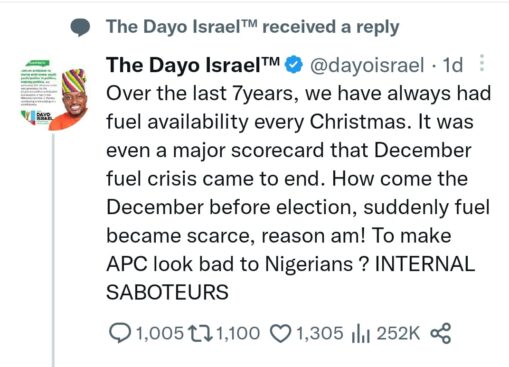FACT CHECK: Was there no fuel scarcity in last 7yrs as APC youth leader claimed?
The national youth leader of the All Progressives Congress (APC), Mr. Dayo Israel, in a tweet recently decried the current fuel scarcity in the country, stating that in the last seven years, Nigeria had always enjoyed sufficient fuel supply during Christmas. Full Text The APC national youth leader on his Twitter handle, @dayoisreal, alleged sabotage […]

The national youth leader of the All Progressives Congress (APC), Mr. Dayo Israel, in a tweet recently decried the current fuel scarcity in the country, stating that in the last seven years, Nigeria had always enjoyed sufficient fuel supply during Christmas.
Full Text
The APC national youth leader on his Twitter handle, @dayoisreal, alleged sabotage in the current fuel scarcity, claiming that it was deliberately targeted at ruining the chances of the party in the forthcoming elections.
He wrote: “Over the last 7years, we have always had fuel availability every Christmas. It was even a major scorecard that December fuel crisis came to end. How come the December before election, suddenly fuel became scarce, reason am! To make APC look bad to Nigerians? INTERNAL SABOTEURS,”
As at the time of this report, the tweet had garnered over one million views and over 3000 quote tweets.
FACT CHECK: Did Sultan of Sokoto endorse Peter Obi ?
FACT CHECK: Is Dangote refinery due for commissioning Jan 24?
Verification
Findings by Daily Trust showed that in the last seven years of President Muhammadu Buhari-led administration, Nigeria had experienced fuel scarcity across the country especially, during the 2017 Christmas period.

Recall that during the Christmas of 2017, many Nigerians were left stranded at filling stations as the fuel scarcity worsened across the country.
Thousands of motorists were queuing up to buy fuel till early hours of Christmas day, as many filling stations did not sell petrol and the few that sold did so at exorbitant prices.
This is despite the repeated assurance by the Nigerian National Petroleum Corporation (now NNPCL) to Nigerians that it had and was distributing more than enough petrol for local use.
But transport fares were hiked while many motorists were stranded without vehicles to travel that year.
As the fuel crisis worsened, many Nigerians accustomed to travelling to their home states for Christmas were stranded at motor parks. Most Nigerians couldn’t afford the almost 100 per cent increase in transport fares or had to cancel their journey for insufficient transportation.
Subsequently, while fuel scarcity persisted three days to the 2017 Christmas, the NNPC and marketers traded blame over the acute commodity shortage.
While the NNPC said marketers hoarded products following alleged plan to increase pump price, the marketers accused the oil giant of making the commodity available in short supply.
However in a statement the then NNPC Group Managing Director, Late Maikanti Baru, claimed some marketers, in their quest to cash in on the situation, suddenly started hoarding products.
The statement signed by the former NNPC spokesman, Ndu Ughamadu, said, “We swiftly swung into action by doubling our supply nationwide. At the time the rumour started, we had about 30-day sufficiency.
“The normal daily supply to the nation is 700 trucks, equalling about 27-30 million litres per day.”
Verdict: False
Background
The APC national youth leader is not the only person alleging sabotage in the current fuel crisis as the party’s presidential candidate had also made the same allegations.
During a campaign rally in Abeokuta, Ogun State on Wednesday, the APC presidential candidate, Bola Ahmed Tinubu, said the scarcity was perpetrated by powerful forces in government to sabotage the elections.
Conclusion:
Findings by Daily Trust showed that Nigeria had experienced fuel scarcity during the Christmas period in the last seven years. Thus, the claim by the APC national youth leader is false.
This Fact Check is produced in partnership with the Centre for Democracy and Development
